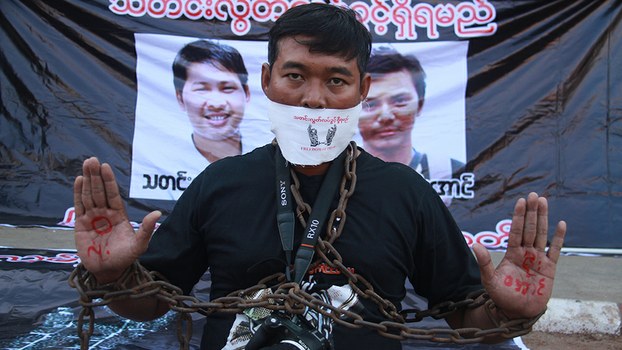




The United Nations Human Rights Council (HRC) should call on Myanmar’s government to undertake immediate reforms to protect freedom of expression in a resolution to be adopted at the conclusion of the body’s 40th Session later this month, a London-based rights group said Wednesday.
In a briefing, Article 19 noted that U.N. Special Rapporteur on human rights in Myanmar Yanghee Lee had expressed concerns over the shrinking of democratic space in the country in an assessment she gave to the HRC in March 2018, and said the situation had worsened since then, despite the promise of more freedoms under State Counselor Aung San Suu Kyi’s civilian government.
The ruling National League for Democracy (NLD) came to power in March 2016 as Myanmar’s first democratically elected civilian government in decades, but Article 19 said the party had failed to use its parliamentary majority to reform laws used against government critics, while proposed legislation could further erode already weak legal protections for the right to freedom of expression in coming months.
Authorities continue to criminalize dissent and criticism, in particular in relation to ongoing conflicts and human rights abuses perpetrated by the state, while the operating environment for the media and civil society “remains fraught,” Article 19 said, leading to widespread self-censorship and government controls on the flow of information in the country.
Against this backdrop, the group urged “all Member and Observer states of the HRC to call on the Government of Myanmar to prioritize immediate reforms to protect freedom of expression” in the resolution to be adopted at the end of the Feb. 25 – March 22 session, and to “raise these concerns during the interactive dialogue with the U.N. Special Rapporteur on human rights in Myanmar.”
Article 19 said the HRC should reiterate its call for Myanmar’s government to reform laws criminalizing dissent and free expression, drop all outstanding charges and convictions of those detained under the laws, and guarantee their immediate and unconditional release.
The HRC should also restate the importance of ending impunity for attacks against journalists and rights defenders, and demand the repeal of the Unlawful Associations and reform of the Peaceful Assembly and Processions acts used to target protesters, as well as urge the government to drop charges and convictions against those detained under the acts, it said.
Furthermore, the rights organization called on the HRC to set specific guidelines on what legislation Myanmar’s government prioritizes for reform and encourage the government to work with civil society and international partners on a concrete, open and timely legislative process.
Lastly, Article 19 said the HRC should push Myanmar’s government to “take a holistic approach” to tackling “hate speech” that includes incitement of discrimination and violence, in compliance with the rights to freedom of expression, to freedom of religion, and to equality, in line with international standards.
Reporters weigh in
Speaking to RFA’s Myanmar Service, Kyi Min, a writer and member of the Myanmar Press Council, pointed out that authorities use a wide interpretation of the law to target journalists, who have been arrested and charged under the Telecommunications Act, Unlawful Associations Act, Official Secrets Act, Media Law, and Aircraft Act of 1934.
In one of the more high-profile cases, Reuters journalists Wa Lone and Kyaw Soe Oo are serving seven-year sentences for violating the British colonial-era Official Secrets Act for possessing classified government documents about a massacre of ethnic Rohingya men and boys in Rakhine state’s Inn Din village during a brutal crackdown by security forces in 2017.
Their convictions drew widespread condemnation from the international community, rights groups and media watchdogs over lack of proof of a crime and testimony that pointed to a police set-up of the two men.
“If journalists write something incorrect, the authorities should charge them under the Media Law, but they were not charged that way,” Kyi Min said.
“This shows that the authorities charge journalists under these acts whenever they think their image is tarnished by their reporting, even if what the journalists write is true.”
Kyaw Min Swe, chief editor of Myanmar’s The Voice journal, told RFA he believes that press freedom in the country “is becoming worse and worse,” and said “everyone in the media feels the same.”
“Obviously, we have a growing number of journalists who have been charged, sentenced or are facing trial, but it is not only a problem for the freedom of expression—the right to information is also increasingly curtailed,” he said, noting that reporters now face several restrictions when reporting on the work of parliament.
“As the current government is a democratic civilian government, elected by the people, it is responsible for promoting an independent media. Only a media free from restrictions and intimidation can provide the checks and balances needed to hold the [executive, legislative and judicial branches] of the country accountable.”
Paris-based Reporters Without Borders (RSF) ranked Myanmar 137th out of 180 countries in its annual World Press Freedom Index for 2018 and said in October that the country’s position is at risk of falling even further in the 2019 index.
Reported by RFA’s Myanmar Service. Translated by Khin Maung Nyane. Written in English by Joshua Lipes.